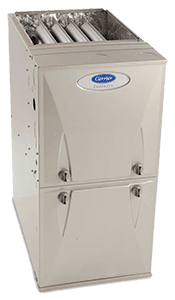
You’re probably looking forward to the warmer summer days after the chilly season in Florida. Your AC is running without problems, but you may be wondering whether you should turn off the heating system. In this article, we will explore the merits and demerits of turning off your gas furnace.
Why You Should Turn Off a Gas Furnace in the Summer
If you have an older furnace model, it will have a light blue fire known as a pilot light. The purpose of the flame is to ignite the gas coming from the burner into the furnace. When you switch on your heating system, a valve will release the gas to start the combustion process.
If your furnace model uses a pilot light, it may be a good idea to turn it off during the summer. A continuously burning flame can generate heat and encourage condensation. The moisture the heat creates is in small quantities. But when it’s summer in Jacksonville, it can make your home uncomfortable.
A continuously running pilot light also consumes significant amounts of gas. Turning it off can save you the money you spend on fuel, even though natural gas is inexpensive. You will also be eliminating the risk of accidentally turning on the furnace in the middle of the sweltering summer.
How to Switch off the Pilot Light
You can wait until you are sure the weather is clear and warm to switch off the pilot light. The process is easy, but there are also precautions you have to take to minimize fuel waste and hazards.
You can switch off the pilot light by turning the knob to the off position. To uphold safety, you can turn off the gas supply to the furnace. But be careful not to turn off the gas supply to the rest of the house. You’ll still need it for cooking, cleaning, heating water, and other activities in summer.
It is also advisable to schedule an inspection of your home’s safety systems. Faulty furnaces can release carbon monoxide, a colorless and odorless gas, prevalent where there is combustion. It can cause severe health problems and, in rare cases, death. Carbon monoxide sensors are the surest way to detect toxic fumes and keep your home safe from hazardous toxins.
When Not to Switch Off the Pilot Light
You may want to wait until the summer when it’s warmer. The weather in Jacksonville can fluctuate erratically in the first month. While the weather is still cold, it’s better to keep the pilot light on. Turning on the device can be time-consuming and an inconvenience.
However, if you can locate the pilot light and don’t have a problem turning it on, you may switch it off. But different gas heating systems have varying pilot light types. The most common may have a valve knob or a gas valve with a red reset button.
You may also want to note the behavior of the pilot light before turning it off. A flame that keeps going out is an issue prevalent with older gas furnaces. It usually indicates there is an issue with the thermocouple or the lighting mechanism of your heating system.
Because pilot light problems can be dangerous, we recommend scheduling service with a certified technician. McGowan's Heating & Air Conditioning can provide timely repair services to restore your Jacksonville home’s comfort and keep you safe.
Signs of pilot light problems:
- The flame is orange-yellow instead of bright blue
- The pilot light keeps going off
- Flickering flame due to a draft
- The flame is on, but the valve does not release the gas
Why Modern High-Efficiency Furnaces Are Different
In older furnace models, there’s a valve that determines when the pilot flame is on before releasing the gas. But the valve can operate without using electricity. The device employs a thermocouple to detect if there is a flame. If the thermocouple does not return any signal, it shuts off the gas supply to prevent a fire hazard.
Modern high-efficiency furnaces use a different mechanism that involves an electronic ignition mechanism. The most widely used electronic ignition technology is the HSI (Hot Surface Ignitor). HSI includes filament that can heat up to 2,500 degrees Fahrenheit when current passes through it.
When you turn on your equipment, gas is released to the burner as it goes through the HSI. Some appliances have a separate flame sensor, while in others, the filament also doubles as the sensor. Regardless of the type, the system will switch off the HSI once it confirms the gas is burning.
So if you have a modern furnace with an electronic ignition mechanism, it’s unnecessary to shut it down in summer. However, the HSI needs to be clear of debris and dust for optimal performance. Therefore, you shouldn’t skip annual maintenance even if you’re using a high-efficiency furnace.
Should You Turn Off a Central Heating System?
If you have a central heating system that works with your air conditioner, it’s not a good idea to turn it off. That’s because your forced air furnace uses the same fan as your air conditioning system. The purpose of the fan in your blower is to circulate conditioned air to your home.
Since they use the same electronic components, you ought to keep them on. But you can shut off the gas supply to the furnace. That way, you can cut down on your fuel consumption and reduce the risk of accidents when the system is off.
On the other hand, if the heating and air conditioning system uses distinct electronics systems, you can turn off the furnace. Turning it off at the circuit breaker will prevent other household occupants from switching on the system accidentally. Cutting off the electrical supply also reduces the chance that someone could play around with the thermostat controls.
Consider a Tune-Up for Your System
After switching off your furnaces, you may forget about it until the cold season begins. But you must spot any issues and organize for repairs as soon as possible. If your system continues running with a fault, it can cause complications that could have severe consequences later.
At McGowan's Heating & Air Conditioning, we recommend scheduling maintenance services in Jacksonville before each season. That means that before you switch off your furnace in spring, call a professional to inspect your air conditioner.
Similarly, it’s best to service your furnace before the cold season begins. Our professionals will inspect your carbon monoxide and fire detectors to keep your home safe through winter. They can clean components and evaluate airflow problems so that the system is free from fault throughout the season.
We also recommend that you schedule an inspection once a year. However, that depends on how often you use your system. The number of occupants in your home is another factor determining how often you tune-up your furnace and AC.
If you encounter any problems with your furnace, turn to our NATE-certified technicians in Jacksonville. Our crew is known for exceptional solutions for heating or cooling repair, installation, and maintenance services. We have experience working with a wide range of models and brands. We also offer HVAC design and build solutions for renovations and new constructions. Talk to our friendly team to sign up for our comprehensive maintenance plan in Jacksonville.



